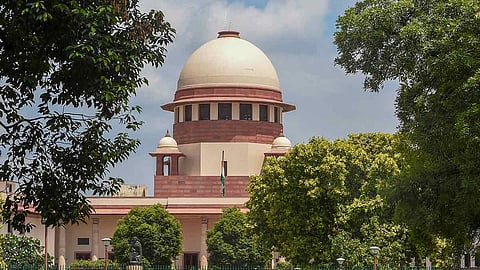

Follow TNM’s WhatsApp channel for news updates and story links.
The Supreme Court, on Monday, September 15, while declining to suspend the entire statute, stayed certain provisions of the Waqf (Amendment) Act including the requirement that a person should be a practicing Muslim in order to create the Waqf. A Bench of Chief Justice of India BR Gavai and Justice Augustine George Masih passed the interim order on a batch of petitions challenging the validity of the law.
“We have held presumption is always on constitutionality of statute and in rarest it can be done. We have found that the entire act is challenged, but the basic challenge was sections 3(r), 3C, 14. We have gone to legislative history from the 1923 Act and considered prima facie challenges to each section and hearing parties, case was not made out for the entire statute. But sections which are under challenge, we have granted stay,” the Bench observed in its order, according to Live Law.
The Court stayed the following provisions:
> Section 3(r): The requirement that a person must be a practicing Muslim for five years before creating a waqf. The Court said this condition “would lead to arbitrary exercise of powers until rules are formed.”
> Section 2(c) proviso: The provision treating waqf property as waqf property, which the Court has held cannot operate for now.
> Section 3C: The provision empowering a designated officer or Collector to decide disputes regarding waqf property and revenue records. The Court said permitting an executive officer to adjudicate property rights violates the separation of powers. “Until finality, the rights of properties will not be affected. Until the title is not decided, neither waqf will be dispossessed of the property,” the order clarified.
> Inclusion of non-Muslim members: The Court held that the Central Waqf Council shall not consist of more than four non-Muslim members, and a State Waqf Board not more than three.
> Section 23: The Court directed that ex-officio officers in Waqf Boards must be from the Muslim community.
On the issue of registration of waqf properties, the Bench clarified that such a requirement existed in earlier laws of 1995 and 2013, and hence does not constitute a new mandate. However, the Court extended the timelines for registration, details of which will be specified in the full order.
According to Bar and Bench, the Court emphasized that its observations are prima facie and “will not prevent parties from making further submissions challenging the validity of the Act.”
The background hearings on the law concluded on May 22, after three sessions of arguments by petitioners and the Centre. The Act, which amended the Waqf Act of 1995, received Presidential assent on April 5, 2025.
Petitioners including All India Majlis-e-Ittehadul Muslimeen (AIMIM) MP Asaduddin Owaisi and Congress MP Mohammad Jawed contended that the amendment discriminates against Muslims. Senior advocate Kapil Sibal termed the law “unconstitutional” and “arbitrary,” objecting particularly to provisions suspending the Waqf status of properties under investigation. Senior advocate Rajeev Dhavan added, “Waqf is not just a legal entity, but a spiritual and social institution deeply woven into the lives of Muslims,” stressing that no external officer could determine essential religious practices.
The Union, represented by Solicitor General Tushar Mehta, defended the law as a secular measure to enhance transparency and prevent encroachment on public property. Mehta argued that waqf boards perform largely administrative functions and that misuse of waqf provisions, including over tribal and government lands, necessitated reforms.
Earlier, on April 17, the Union government assured the Court it would not enforce certain contentious provisions pending judicial scrutiny, leading the then CJI Sanjiv Khanna-led Bench to decline a stay.